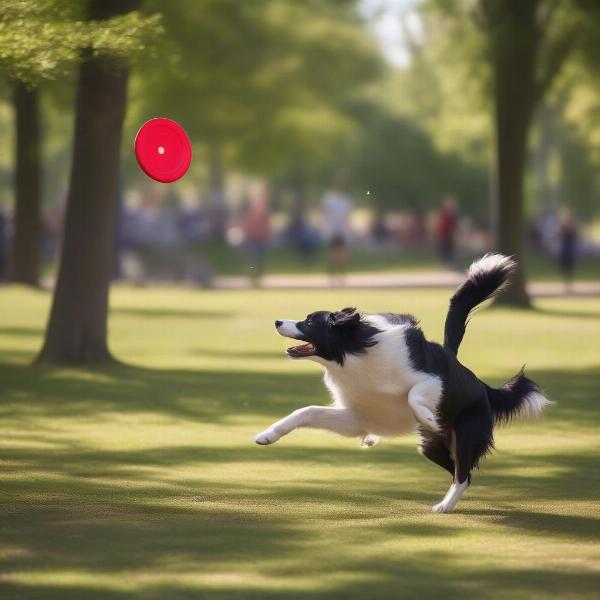If you’ve ever caught your canine companion gnawing on a towel, you’re not alone. This common behavior can be puzzling, and understanding the reasons behind it is key to addressing it. From teething puppies to anxious adults, towel-chewing can stem from a variety of factors. This article will explore the potential causes and offer practical solutions to help redirect your dog’s chewing habits to more appropriate items.
Many dog owners wonder why their furry friends are so drawn to towels. Could it be the texture, the scent, or something else entirely? The answer isn’t always simple, as towel-chewing can be triggered by a combination of factors. Let’s delve deeper into the most common culprits.
Teething Troubles
Puppies, just like human babies, experience discomfort during teething. Chewing on soft objects like towels can help soothe their sore gums. This behavior typically starts around 3-4 months of age and gradually subsides as their adult teeth emerge.
Anxiety and Boredom
Towel-chewing can also be a sign of underlying anxiety or boredom, especially in adult dogs. If your dog isn’t getting enough physical exercise or mental stimulation, they may turn to destructive behaviors like chewing to relieve stress and occupy themselves. Separation anxiety can also manifest as excessive chewing, with towels often becoming a target.
Attention-Seeking Behavior
Sometimes, dogs chew on towels simply to get your attention. Even negative attention, like scolding, can reinforce this behavior in some dogs. They quickly learn that chewing on a towel gets a reaction from their owner, even if it’s not the reaction they intended.
Medical Reasons
In rare cases, towel-chewing can be a symptom of an underlying medical condition, such as pica (the craving for non-food items) or gastrointestinal issues. If your dog’s chewing is excessive or accompanied by other symptoms like vomiting or diarrhea, consult your veterinarian.
How to Stop Towel-Chewing
Addressing towel-chewing requires a multi-faceted approach that targets the underlying cause. Here are some effective strategies:
-
Provide appropriate chew toys: Offer a variety of textures and flavors to keep your dog engaged and satisfied. Durable rubber toys, puzzle toys, and chew treats are excellent choices.
-
Increase physical and mental stimulation: Ensure your dog gets enough exercise through walks, playtime, and interactive games. Mental stimulation is equally important – try training sessions, puzzle toys, and scent games.
-
Manage anxiety: If anxiety is a contributing factor, consider creating a calming environment for your dog. Provide a safe, comfortable space where they can retreat when feeling stressed. Pheromone diffusers or calming supplements can also be helpful.
-
Redirect the behavior: When you catch your dog chewing on a towel, redirect their attention to an appropriate chew toy. Praise and reward them when they engage with the correct item.
-
Make towels less accessible: Keep towels out of reach, especially when you’re not home to supervise your dog. Store them in closed cabinets or drawers.
-
Seek professional help: If you’re struggling to manage your dog’s chewing behavior, consult a certified dog trainer or veterinarian behaviorist. They can help you develop a tailored training plan and address any underlying behavioral issues.
 Dog Playing Fetch in Park
Dog Playing Fetch in Park
Conclusion
Understanding why your dog chews on towels is the first step to addressing this often frustrating behavior. By considering factors like teething, anxiety, boredom, and attention-seeking, you can implement appropriate strategies to redirect your dog’s chewing habits and provide them with more suitable outlets for their natural instincts. Remember, patience and consistency are key to achieving long-term success.
FAQ
- Why does my puppy chew on everything, including towels? Puppies explore the world with their mouths, and chewing helps relieve teething discomfort.
- Is it dangerous for my dog to chew on towels? Ingesting towel pieces can cause intestinal blockage, so it’s best to discourage this behavior.
- What are some good chew toys for an anxious dog? Durable rubber toys, puzzle toys, and chew treats can help relieve anxiety and boredom.
- How can I tell if my dog’s chewing is due to anxiety? Signs of anxiety can include excessive panting, pacing, whining, and destructive behavior.
- Should I punish my dog for chewing on towels? Punishment can worsen anxiety and damage your bond with your dog. Focus on redirection and positive reinforcement.
- When should I consult a veterinarian about my dog’s chewing? If the chewing is excessive, accompanied by other symptoms, or unresponsive to behavioral interventions, consult a vet.
- Can older dogs also develop towel-chewing habits? Yes, older dogs can develop this behavior due to changes in their environment, health, or cognitive function.
About ILM Dog
ILM Dog is your trusted resource for expert advice on dog care and wellbeing. We cover everything from breed selection and puppy care to senior dog health, training, nutrition, and product recommendations. Our mission is to empower dog owners worldwide with the knowledge and resources they need to provide their canine companions with the best possible care. Contact us for personalized guidance: Email: [email protected], Phone: +44 20-3965-8624.